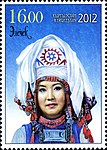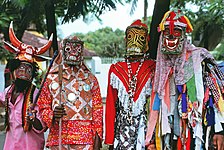GLAM/Newsletter/November 2023/Contents/Wiki Loves Living Heritage report
|
2023 Living Heritage elements are added to Wiki Loves Living Heritage
New 2023 Living Heritage elements have been added to Wiki Loves Living Heritage
The Eighteenth session of the Intergovernmental Committee for the Safeguarding of the Intangible Cultural Heritage was held in Botswana Tuesday 5 to Friday 8 December 2023. As part of the formalities, 55 new heritage elements were added to the UNESCO Lists of Intangible Cultural Heritage. 45 elements were added in the Representative List of the Intangible Cultural Heritage of Humanity, 6 in the List of Intangible Cultural Heritage in Need of Urgent Safeguarding, and 4 in the Register of Good Safeguarding Practices. All of these are now also added to Wikidata, and they can be viewed in Wiki Loves Living Heritage on their own page, as part of UNESCO elements list and individual country lists.
Join checking the information and enriching the Wikimedia projects!
- Translate item names and descriptions on Wikidata.
- Quality check if the nominations have been associated with the correct items. Link them to associated other items.
- Create and link Wikimedia Commons categories to images, create SDC statements. Upload new images, and join your local focal point in this quest.
- Create or translate articles about the new elements in your language Wikipedia!
Presentations about bringing Living Heritage to Wikimedia projects
Different aspects of bringing Living Heritage data to Wikimedia projects have been presented in different Wikimedia events.
| In WikidataCon, the presentation Bring Your Data to Wiki Loves Living Heritage gave an overview of how data has been used in the Wiki Loves Living Heritage project. | |

|
In GLAM Wiki 2023, the presentation Stretching Meta described in-depth how the limits of wiki editing were tested to create the Wiki Loves Living Heritage pages. There's also sunshine is sight: Meta is a great place to share learnings in the Wikimedia movement, and more effort should be put into making it attractive for visitors and editors alike. |

|
Finally, the presentation Modelling Living Heritage in the Wikidata Data Modelling Days delved into detail in modelling data for living heritage. View the recording. |
Moving forward
AvoinGLAM will continue supporting working with Living Heritage in 2024. The global campaign ends, but the practices and resources will be made available in different program formats affiliates and groups around the world wish to work with.
- Susanna Ånäs continues facilitating data imports and maintaining the project pages.
- We will also start developing a global coordination structure for working with living heritage topics during 2024 together with all organizers.
Heartfelt thanks to all participants!
Inventories have been added from more 100 countries, activities have been organized in more than 30. The number of articles around living heritage keeps on rising due to the increase of articles but also as more and more elements are recognized as living heritage.
The project has laid a firm foundation for collaborations between intangible cultural heritage focal points and Wikimedia affiliates for the years to come. It is also doing essential work in finding ways to strike the balance between opening and protecting. Rather yet, not putting the objectives against each other but side by side: facilitating opening knowledge in ways that are respectful of the rights of the people and the cultures represented.
The work has been a major effort from our partners. Leena Marsio from the Finnish Heritage Agency and Jorijn Neyrinck from Workshop intangible heritage Flanders have put their heart and soul to this project. Sadik Shahadu has been a great companion and communicator. The European Heritage Days, Workshop intangible heritage Flanders & Flemish Commission for UNESCO in Belgium, Quebec Council for Living Heritage, the Finnish Heritage Agency, the Dutch Centre for Intangible Cultural Heritage, and the Federal Office of Culture in Switzerland provided financial support for the project, allowing to fully focus on this project. Thank you to Creative Commons and Wikimedia Culture & Heritage and all the speakers and presenters in the webinars.
The activities are the result of the work of numerous Wikimedians and focal points and other local actors who have found their own ways to express their local heritage. What can be seen on the pages has gone through the hands of translators, coordinators, photographers and Wikimedians behind the curtains. They all work together on this and other topics of the word, making ancient and recent knowledge visible and weaving connections between them relentlessly.
We have just started the work. Looking forward to exploring living heritage together again in 2024!







